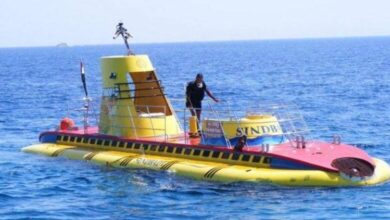For most people, the Red Sea’s coral reefs are little more than pretty to look at. But for those living near the Red Sea coastline, the reefs are at the very heart of their livelihoods. It is a fragile relationship, one dependent on the reefs’ ability to attract the thousands of tourist and divers who bring their money and enthusiasm to the Red Sea coast each year.
The threat of climate change and the accompanying warmer seas looms large over the reef ecosystems’ health and the livelihoods they sustain. More and more people are asking what exactly we can expect to happen to this precious cornerstone of the tourist industry over the next 20 years.
It’s a pertinent question. Tourism pumps an estimated US$7.8 billion into the Egyptian economy each year, providing employment for 12 per cent of the national work force. A significant portion of Egypt’s tourism is from the approximately 540,000 divers that visit the Red Sea each year to see its coral. Does climate change mean it’s just a matter of time before these divers cease to have anything to see, anything to lure them to the Red Sea?
In the case of Australia, famous for the Great Barrier Reef, the largest single structure ever built by living organisms, the clock is already ticking. Charlie Veron, former chief scientist of the Australian Institute for Marine Science, was recently quoted in The Times saying that rising water temperatures will leave the Great Barrier Reef virtually unrecognizable within 20 years. “There is no way out, no loopholes,” he said conclusively.
In the Red Sea, however, there is a mystery that continues to baffle marine biologists: its corals are not bleaching, at least not to the degree seen in dying corals elsewhere in the world. Few claim to know the reason behind this. “There are many theories, but no one really knows why,” says Amr Ali, the managing director of the Hurghada Environmental Protection and Conservation Agency’s (HEPCA).
Ali suggests that among the likely reasons Red Sea coral isn’t bleaching is the sea itself, which is quite warm due to the chain of mountains on either of its coasts. “Red Sea corals have proven resilient to climate change so far partly because they are already adapted to warm waters,” he says, emphasizing that resilience, the ability to spring back to life despite environmental pressures like rising sea temperatures, is key to the survival of the reefs.
According to Ali, this means that ensuring the reefs are managed in a way that sustains their resilience should be the highest priority. “Overfishing, stress from excessive diving, pollution, thoughtless urban planning … all these things increase the likelihood of bleaching,” he says, "And it’s these things we need to worry about right now."
One of the more significant, though as yet tentative, measures recently drawn up to help aid reef resilience is the Hurghada Declaration, a government-approved, though as yet unimplemented, fishing law that practically transforms the entire Red Sea into a no catch zone.
If executed, the law will dramatically reinvigorate the coral reef systems in the Red Sea, as much of its fish stocks are presently depleted–a major cause of stress for the ecosystems that coral reefs are a part of. Ali explains that “the entire Red Sea contributes only 0.5 per cent to total fish catch in Egypt, so banning net fishing here will make no real difference to the agricultural and fishing industry, but it will make a huge difference for the environment and the tourism industry.”
Despite the potential impact of this law, few would conclude that it would be sufficient. Researchers and conservationists highlight the need to tackle this problem from every possible angle. Arguably, one of the most vital of those angles is awareness, specifically among tourist divers and operators, who interact daily with these stressed ecosystems.
A recent study conducted in the Egyptian Red Sea by Australia’s Commonwealth Scientific and Industrial Research Organisation and the International Union for Conservation of Nature, interviewed 150 dive tourists and 35 dive operators.
The study found that 90 per cent of tourist divers stated that they are more likely to choose a dive operation that was “environmentally friendly,” while 60 per cent of dive operators reported that they noticed a lot of “dead looking coral.” Nevertheless, the researchers concluded that, ultimately, there was a notable disparity between dive tourists and operators in terms of awareness, with the former significantly more concerned with the importance of being as eco-friendly as feasibly possible.
For Frederique Morisod, Guest and Ground Services Manager of Blue O Two, one of the larger diving centers in the Red Sea, “lack of awareness among other dive operators is probably only a short-term problem.” Given the increasing demands for eco-friendly diving packages by tourists in recent years, operators who are unable to adapt will simply fall out of the competition.
Blue O Two is already offering a week long diving safari based around “reef-clean ups.” This dive package, which is called Hayah and is subsidized by HEPCA as part of a larger campaign, emphasizes raising awareness among divers and involves dives dedicated to clearing plastic bags and other debris in and around reefs. Eight of these so-called safaris will be held this winter, each expected to include around 25 divers.
Blue O Two, however, is not alone in its optimism about a more eco-friendly and sustainable diving industry in Egypt. Sharon el-Shoura, manager of Emperor Divers, another of the larger diving centers in Egypt, is hopeful that the worst can be avoided with the right steps, noting the recent ban on plastic bags in the Red Sea Governorate.
Despite increasing concerns about climate change, many dive operators in the Red Sea expect that the next decade will attract more divers than ever before. “As flights get taxed more heavily to help reduce demand and therefore carbon emissions, prices will go up and fewer people in Europe will be able to afford traveling to dive in the Pacific,” says Morisod. “The Red Sea will be a closer, cheaper option–not to mention possibly having the least bleached corals also.”
The Australian study supports this line. In the study, 34 per cent of tourist divers listed “proximity to home” as the most important factor in choosing their destination. “You can see this happening even this year with the economic crisis forcing people to pick cheaper destinations,” notes Morisod.
Ultimately, the signs, in the short-term at least, appear to be positive. The Red Sea’s coral reefs seem to be more resilient than others, and the industry may well continue to grow as more divers flock to its relatively cheaper shores. “But you can never tell,” concludes Ali, “We will do everything we can to sustain the reefs’ resilience, but it’s possible that once climate change really kicks in, it won’t matter just how resilient they may be.”




